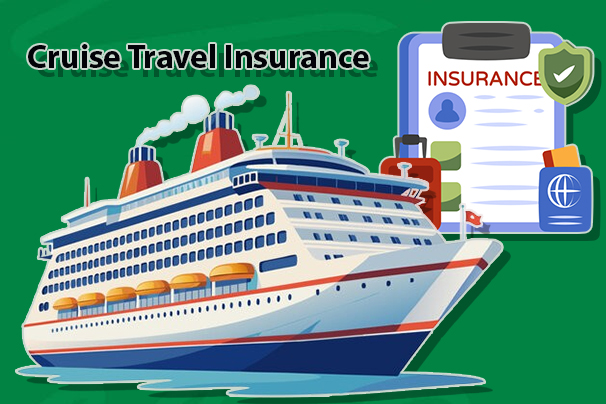If you intend to travel by sea, make sure to secure your cruise travel insurance. While you may have a perfect trip devoid of illness, injuries, and delays, it’s right to plan for unforeseen disasters that could bring your good time to a halt. If you suffer an injury or become sick while on an island excursion, your cruise travel insurance may pay for it.

Additionally, it’s commonly known as trip cancellation insurance, which pays you back if your cruise is suddenly delayed, rejected, or halted for a covered cause. Furthermore, you can purchase specialized coverage or add cruise travel insurance to your regular travel insurance. Here are some things you need to know about this policy.
What is Cruise Travel Insurance?
Cruise travel insurance can be any type of travel insurance policy that includes the features you desire for coverage. It doesn’t need to be a travel insurance plan with the word “cruise” in the name. Moreover, due to the high expense of making up lost time on a cruise, it is advantageous to have coverage for missed connections in a cruise insurance policy.
If you have paid in advance for nonrefundable travel expenses when you have to cancel your cruise, purchasing cruise travel insurance is the right option. In addition, it can cover lost luggage, trip delays, emergency medical evacuation, and other expenses related to medical care received while on vacation.
What Does Cruise Travel Insurance Cover?
You can pay a higher price, but your cruise travel insurance will be customized to include the required protection you will need on your cruise. Although policies differ from one insurer to the next, standard cruise cover consists of:
Missed departure
We can cover you when your vehicle breaks down, your train is canceled, or you misplace your passport and are unable to leave. With cruise upgrades, all ports on the cruise itinerary are covered for late departures and connections.
Cruise interruption
Your travel insurance will pay for the expense of getting to the next port so you can resume the cruise after receiving medical attention. This outcome occurs if a medical emergency interrupts your cruise vacation and necessitates hospital care on land.
Missed port
This coverage can assist in making up for missed ports if the itinerary needs to be changed. This outcome occurs when individuals carefully select the destinations they want to visit on their cruise.
Cabin confinement
It is never pleasant to be taken unwell on board. However, to ensure your safety and the safety of others, the captain could lock you in your cabin. If this is the case and you end up missing portions of your itinerary, we can assist in making up for each 24 hours.
Unused pre-booked excursion
You can miss scheduled trips if a sickness or injury keeps you confined to your cabin. However, cruise travel insurance can assist you in covering the expenses.
Increased personal baggage limits
You could need additional space in your luggage if you’re going on a long cruise. This coverage will now cover a higher amount on cruises, so feel free to bring along an additional pair of shoes.
Cruise cancellation or curtailment
Cruise cancellation or curtailment is helpful for unanticipated events, such as the death of a close relative or a layoff, forcing you to cancel or shorten your vacation.
Emergency medical treatment expenses
Emergency medical treatment expenses should include emergency coverage if you are unable to utilize your original ticket. This coverage includes helicopter transfers, hospital and ambulance fees, and transportation coverage.
Generally, cruise travel insurance offers a constant hotline in case of emergencies while traveling. Moreover, pre-existing medical conditions are also available if you purchase coverage within 14 to 21 days after your original trip deposit. This implies that any pre-existing condition-related medical costs that develop while you are traveling will be paid for.
What Does Cruise Travel Insurance Not Cover
As travel insurance gives as much cruise coverage as possible under your plans, there are several situations when travel insurance does not cover. The following includes;
- Events or causes of a claim that occurred before booking the trip or acquiring insurance are not covered. This coverage covers unforeseen circumstances beyond the insured’s control.
- Claims that are less than the excess for that particular portion of coverage. You can’t claim a £40 lost item if your baggage excess is £60.
- All of our cruise travel insurance policies provide cancellation coverage, though there may be certain exceptions. For example, if you decide not to attend, you will not be compensated for cancellation.
How Much Does Cruise Travel Insurance Cost?
The cost of cruise insurance starts at £12.90. Moreover, the expense of this policy is based on the following factors:
Your trip location
The more nations you visit, the greater your insurance risk of something going wrong. Similarly, if you’re traveling to a risky or isolated location, the price may be greater because it costs the insurance more to pay a claim.
The length of the trip duration
Longer vacations may impose more charges because there is a significant risk of problems that occur during that period.
Number of individuals covered
If you’re traveling with others, request a quote for group or family coverage. This can occasionally save you money in the long run, just like normal travel insurance does.
Pre-existing medical condition
If one person on a family policy has a pre-existing medical condition, they may increase the insurance price for the whole family. However, get quotes for individual policies and compare that against a group one.
Age
The age of individuals traveling, especially older tourists, may face greater charges due to an increased risk of medical problems.
Pre-existing Medical Conditions
If you have a major health issue, your cruise travel insurance will probably cost extra. However, don’t lie to an insurance company because it could result in your claim being rejected. Pre-existing medical conditions can include things like:
- High Blood Pressure
- Diabetes Cancer
- Stroke
- Heart and respiratory issues
Your insurance may cost extra if the insurer believes you are more likely to require medical treatment while on vacation owing to a pre-existing condition. Some insurers may refuse to provide cruise travel insurance if you have a significant medical condition, particularly if you are receiving treatment or awaiting surgery.
Furthermore, when you disclose a medical condition, it will only show you prices from insurance companies that will cover it with no exclusions.





